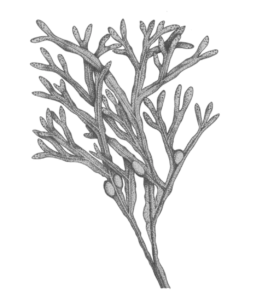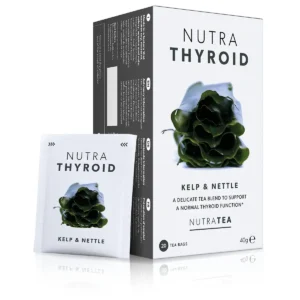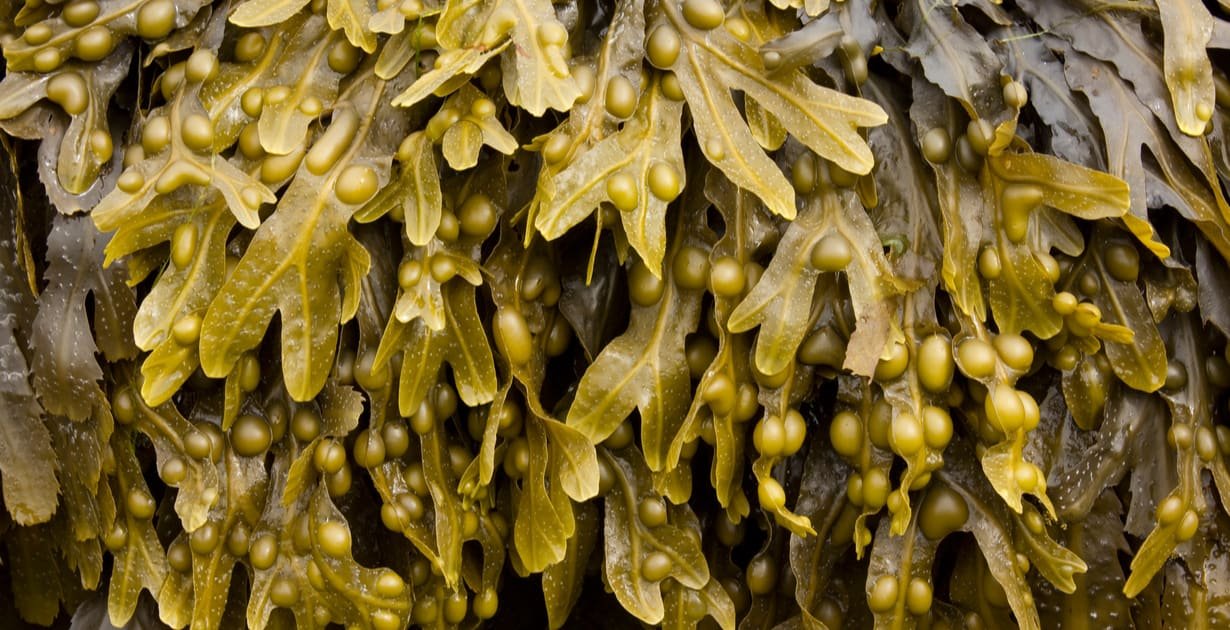Bladderwrack, A Very Special Kelp
Bladderwrack (Fucus vesiculosus) is a variety of kelp in the brown seaweed family. Vast kelp forests grow along rocky shores in the northern hemisphere. Coastal peoples have always prized kelp as a medicinal food. Adding a little Bladderwrack kelp to your diet can offer health benefits and prevent and treat thyroid dysfunction, digestion issues, cancer, diabetes, high blood pressure, and some hormonal imbalances.

Spring harvest of bladderwrack.
Nutrients
Kelp contains calcium, magnesium, iron, potassium, folate, zinc, trace elements, enzymes, nucleic acids, amino acids, and vitamins K, A, C, E, B12, B6, B5, B3, B2, and B1.
Thyroid Dysfunction
Bladderwrack is uniquely rich in iodine, a trace element our body cannot produce on its own but needs to make thyroid hormones. Iodine is scarce in other foods, so it’s easy to be deficient, leading to thyroid dysfunction. The thyroid is a butterfly-shaped gland in the front of the neck, under the voice box, that releases the thyroid hormones triiodothyronine (T3) and thyroxine (T4). Thyroid hormones regulate your weight, metabolism, energy levels, endocrine system, internal temperature, and growth of bones, skin, hair, and nails.
Iodine deficiency is the most common cause of an underactive thyroid, leading to hypothyroidism. Hypothyroidism often runs in families and is more common in women. Symptoms of hypothyroidism include weight gain, dry skin, constipation, tiredness, depression, feeling cold, and menstrual irregularity. Sometimes the whole thyroid gland becomes enlarged and sometimes individual lumps called nodules grow in the gland. It is important to see a doctor if you notice any changes in your thyroid gland. If you suspect you have thyroid dysfunction, have your doctor check your levels of thyroid stimulating hormone (TSH), T3, and T4. Discuss with your doctor whether supplementing with kelp is right for you.
Diabetes
Bladderwrack can help regulate blood sugar thanks to:
All of these fight diabetes and obesity by reducing blood glucose levels and increasing insulin sensitivity.
Indigestion
The brown alga is full of dietary fiber in the form of the polysaccharides alginic acid, fucoidans, phlorotannins, and laminarin. All four are antioxidant and anti-inflammatory and promote digestion and a healthy gut microbiome. Alginic acid acts as a demulcent, easing gastroesophageal reflux disease (GERD), heartburn, and indigestion. Kelp helps resolve gastric and duodenal ulcers, ulcerated colon, colitis, constipation, and diarrhea.
Cancer
Supplementing with kelp can help prevent cancers, particularly breast and colon cancer, by enhancing immunity, inducing cancer cell apoptosis, inhibiting cancer cell invasion and metastasis, or directly scavenging oxidative free radicals that induce cancer cell changes. This is thanks to the actions of fucoidans, phlorotannins, laminarin and fucoxanthin. Phlorotannins even protect healthy tissue in people undergoing radiation therapy.
High Blood Pressure
The sea vegetable strengthens circulation, encourages healthy cardiac contractile force and rhythms, and lowers blood pressure and LDL (“bad”) cholesterol. Kelp’s sodium doesn’t cause high blood pressure; sodium chloride (table salt) does. Kelp’s high
potassium content balances out table salt’s effect on blood pressure. Some people substitute table salt with dried and granulated kelp, which has a similar salty taste. Fucoidans are anti-coagulant and have the same structure as Heparin, a blood-thinning medication that’s been used for over fifty years. Laminarin also helps reduce cholesterol uptake.

Kelp frond.
Hormonal Changes
Kelp is a gift for women of all ages. Regular consumption of kelp is linked to decreased risk of estrogen-related cancers in Japanese populations. It balances sex hormones during all phases of the menstrual cycle and helps stabilize hormonal mood swings. Pregnant women benefit from its iodine content because the element is crucial for proper bone and brain development in babies during gestation and infancy. In Traditional Chinese Medicine, new mothers are given kelp (called Kun Bu) to support lactation, though many doctors now discourage this practice. Perimenopause and menopause usher in big changes to the body that produce free radicals. Kelp scavenges free radicals, preventing oxidative stress. Kelp’s high levels of calcium, magnesium, and iron keep bones strong and ward off osteoporosis in older women.
Our Kelp Tea
NutraTea herbalists created NutraThyroid: Kelp and Nettle tea blend to help you harness kelp’s healing powers. We blended Bladderwrack with Nettle (Uritca dioica), Lemon Balm (Melissa Officinalis), Bugleweed (Ajuga reptans), Ashwagandha (Withania somnifera), Rhodiola (Rhodiola rosea), Siberian Ginseng (Eleutherococus senticosus), Licorice (Glycyrrhiza glabra), Black Walnut (Juglans nigra), and Bacopa (Bacopa monnieri). These ancient healing herbs all work synergistically with kelp to support balance and vitality. When you drink our Kelp and Nettle tea blend, envision nourishing your inner ocean with all the nutritious riches of the seaweed forest.


